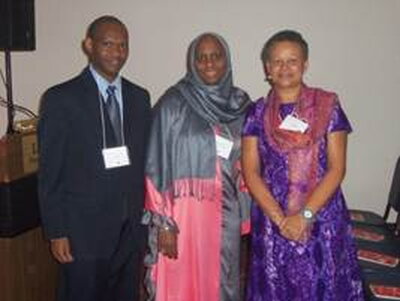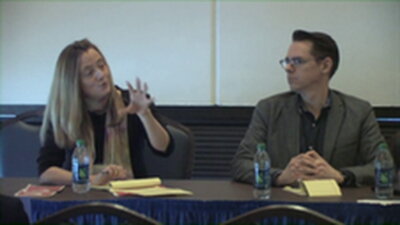

From L to R: Abu Bah, Northern Illinois, Maimouna Barro and Merle Bowen, both of CAS
On March 11, CAS hosted a one day conference on peacebuilding in West Africa. The event, which about 50 people attended, featured a number of national experts on the region. The Mayor of Urbana, Laurel Prussing, opened the day’s program by highlighting the important roles such events play in linking Urbana to other parts of the world.
Scott Straus, Professor of Political Science at University of Wisconsin, delivered the first paper. He countered the stereotype of Africa as a continent of endless and escalating conflicts. In fact, according to Straus, from the period 1960-2008, the average duration of military conflicts in Africa, be they internal, interstate or internationalized, was less than that in Asia. Furthermore, Asian countries had 50% more internal conflicts (“civil wars”) than their African counterparts. Nonetheless, three African regions remain unstable: the Great Lakes, the Sahel and the Horn. He also noted that in these three regions “big wars” no longer prevail. Rather, localized conflicts often focusing on access to resources such as water and land have become more common. Also, there is a rise in election-related violence. Straus attributes the decline in big wars to geopolitical factors like the end of the Cold War as well as improved peacekeeping and conflict resolving methods.
When it comes to conclusions and solutions, Straus admitted that this was all still a work in progress. For him, that was part of the reason why this conference was so relevant.

The highlight of the day was the session on Mali, where a French military action has been ongoing since early this year. Gregory Mann of Columbia University and Susanna Wing of Haverford College (in photo above left), two leading experts on the Malian situation, tried to place the conflict in the greater picture of the region and analyze to what extent the French presence was a necessary, though far from ideal, alternative. Mann noted that there were actually a number of wars within the war--a battle for the Malian government to re-assert its authority, a battle for the local rebels to gain autonomy in the Northern part of the country, a front opened up by externally oriented rebels loosely referred to as the Mojahadeen and finally the French forces who likely have an agenda beyond rescuing the Malian government. In fact, Mann argued that the longer the conflict continues the more the French and Malian interests are likely to diverge. All of this makes for a complicated peacebuilding process, one which is far from satisfactorily off the ground.
Political Scientist Susanna Wing attributed the emergence of the conflict to a series of failures on the part of the Malian government. She particularly emphasized the shortcomings of a decentralization policy which largely contradicted a centralization of powers by former military man President Amadou Toumani Toure (known as ATT). Ultimately, however she said the war was the result of a failure of dialog. While the 1990s democratization process in Mali was quite participatory, all that came after seemed to take another direction. She also noted that while elections have been scheduled for July, this appears unlikely as the conflict continues and 400,000 people remain displaced.
The talks by Mann and Wing set the stage to discuss events in other parts of the region and beyond. Hence, the day carried on with talks by U of I faculty including Tom Bassett, who along with Carol Spindel, spoke about conflict in Cote d’Ivoire. Bassett presented the results of a recent survey he conducted among Ivorian university students which showed that the majority of them laid the blame for conflict on a deteriorating economic situation, especially high rates of unemployment.
Tim Wedig of Global Studies and Maimouna Barro of the Center for African Studies offered cases of successful conflict resolution and peacebuilding in Rwanda and Senegal respectively. Both stressed the need for local involvement in peacebuilding. Wedig noted that there were international mediators present in Rwanda at the outset of the genocide in 1994, but they failed to catch wind of the impending debacle.
Abu Bah of Northern Illinois gave the closing notes, summarizing key points for the day and suggesting paths for future collaboration among this group of scholars. Given the level of conflict in Mali, and the extent to which Western media tend to ignore such events, further scholarly intervention seems a critical element in raising public awareness on this issue.